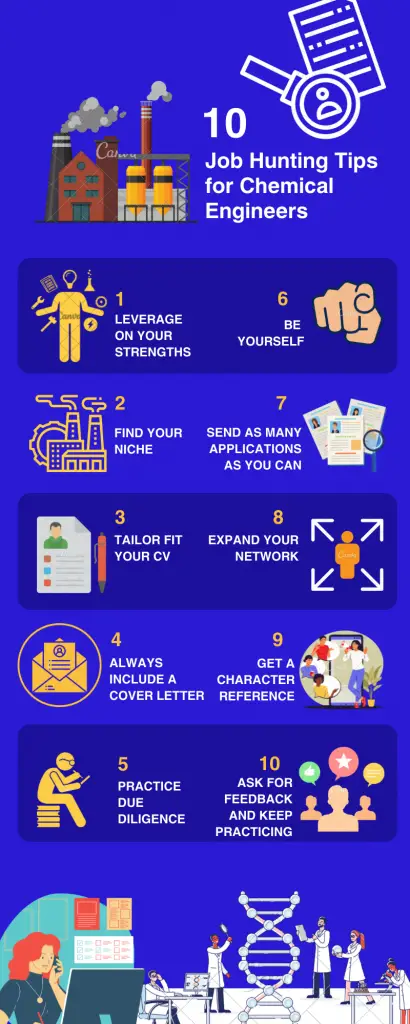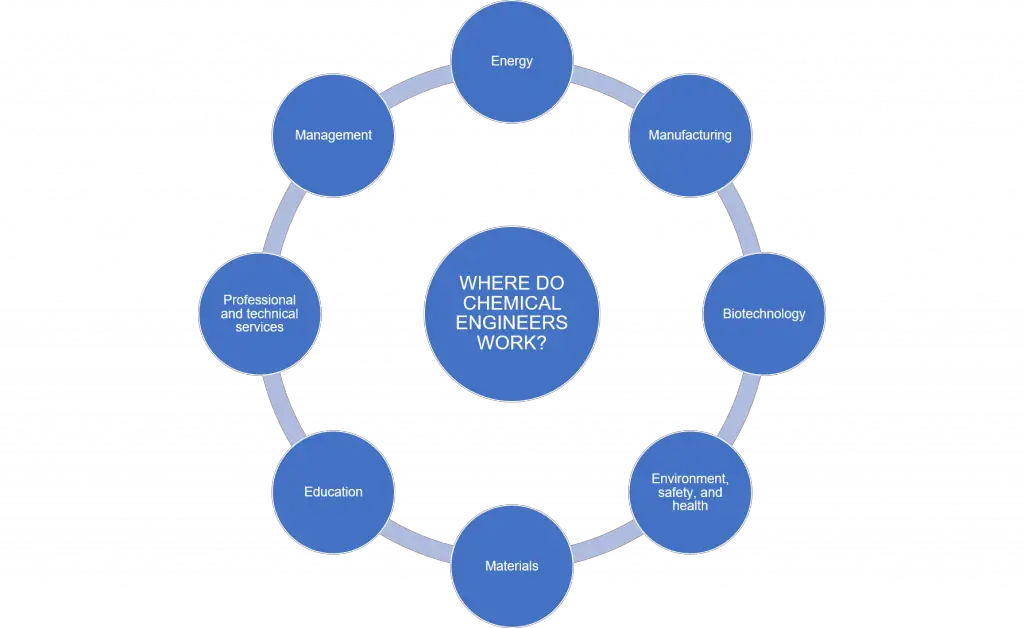

If you’re a fresh chemical engineering graduate, perhaps you’re thinking what your career options are? What types of jobs can chemical engineers get in 2023?
Although employment rate for chemical engineers is rising, the number of chemical engineering graduates also increases. In Canada, for instance, projection for the period 2019-2028 shows 3,600 job openings for 5,500 job seekers.
Hence, it would be quite challenging to get a job in chemical engineering — but not that hard especially with the right knowledge, skills, and attitude.
If you’re a fresh chemical engineering graduate, then you’ve come to the right place because we’ve got actional job hunting tips for you!

There are numerous technical skills that hiring companies look for job seekers such as, but not limited to:
Unless you’re a multi-faceted chemical engineer, there will be a select few only of these skills that you’re exceptionally good at. Think back on your undergraduate years and remember what problems you enjoyed solving.
Knowing your strengths will be your key advantage because you’ll find the type of chemical engineering job to be the right fit for you. The more likely you’ll find the nature of work you’ll not just survive in, but thrive in.
Among other types of engineers, chemical engineers are the most versatile ones so you can find them in almost every sector and industry, such as, but not limited to:

Get to know yourself and find what piques your interests the most. Just like Tip # 1, finding your niche will direct you to a more fulfilling chemical engineering job especially in the long term.
Some common job titles of chemical engineers are:
…and so much more! Each role has distinct duties and responsibilities, requiring specific skills. Each hiring company have its own core values, work culture, and history. But a common mistake that most fresh graduates do is sending the same CV to every job application.
Tailor-fit your skills and achievements to what the company is looking for and what the job position entails you to do. Use a CV template, but make sure to add a few tweaks depending on the role you want to fill in. Also, keep your CV short, sweet, and easy to read.
A cover letter gives the recruitment team a sneek peak to your personality.
Communicate to them what they won’t find in your CV. Tell them what you think about their company and why you’re interested in applying for the job vacancy. Highlight which specific achievement and skills will make you the right fit for the job.
You must do your research in every step of the hiring process, especially as soon as the recruiter makes contact with you. If available, check out the Linkedin profiles of your interview panelists and learn more about their professional background — the university they came from, their work experience, industry of expertise, and mutual connections (if any). Find something common to make it easier for you to create rapport during the interview.
These people will make the decision whether or not to hire you, so make the effort. They could also possibly be your colleagues. When prompted, ask questions about their work environment and routine too. See if you would want to be a part of that organization.
Your CV got you an interview invitation, great! But employers will want to see the whole package during interviews, particularly your soft skills in action.
Put your best foot forward, but never oversell yourself. Although “fake it till you make it” is good advice for feigning confidence, just make sure you don’t overdo it. It’s best to just be you — don’t be afraid of showing your personality (while still being professional, of course).
Job hunting is a numbers game. The more applications you send, the higher your chances of getting hired.
Where can you find job opportunities for chemical engineering graduates? You may check out:
You can only do so much by yourself. Don’t hesitate to ask around from your previous instructors/professors, intern supervisors, and ex-colleauges for career opportunities. Join professional organizations and enjoy meeting fellow chemical engineers. You might even meet a mentor!
See if you can get character references from established chemical engineers in the industry. If you know someone working in the company you’re applying for, try asking for a recommendation. Ask for their contact details (email address or mobile numbers) and place them in your character references in your CV.
Most importantly, ask for consent first. Only consider this tip if your character reference is comfortable or willing to represent you.
Unless you’re extremely lucky, you won’t get a job after a single application only. After following Tip # 7, you may receive a lot of interview invitations, go through their hiring process, but end up getting rejected. Do your best, hope for the best, but expect rejections along the way. Be patient with yourself and trust the process.
Meanwhile, for every rejection, don’t forget to thank your recruiters for their time and ask for feedback. What could you improve on for the next interview? Always learn from your experiences and eventually, you’ll land that first job — one that’s the right fit for you.
Employers looking to hire fresh graduates must at least have a Bachelor’s Degree in Chemical Engineering, a 4-year degree program offered by select universities. It is important to figure out if chemical engineering is right for you, then follow the steps to becoming a chemical engineer.
It depends on the geographical location and type of industry.
For example, in the U.S., about an average of 2,000 openings per year is projected from 2021 to 2031 with a 14% employment growth much faster than other engineers and other occupations. Most chemical engineers work full-time in the chemical manufacturing industry and in professional, scientific, and technical services — such as in engineering services and research development.
In Canada, chemical engineers earn $25 to $76.44 per hour on average (as of December 2021). Alberta has the highest hourly median wage of $57.69.
8 Responses
thanks for info
Hi theengineersperspectives.com owner, Your posts are always well-supported by facts and figures.
Hi, My name is Ashwini Kamble. I am 2015 year passout student. I don’t have any experience but i recently did process equipment designs course and ASPEN COURSE. now i want to start my career in chemical engineering . So is it possibly to get a job in chemical field after a long gap. Pleasure do reply me sir…. I recall need feedback….
WHERE DID YOU LEARN ASPEN HYSIS ???
Job Seeker
It sounds like engineers make good money. That makes sense if they are in hard schooling for that long. I’ll have to do some digging into electrical engineering applications.
Hi theengineersperspectives.com owner, You always provide great examples and real-world applications.
Such great words have been put together to create such a fantastic write-up as this. This content has helped me understand a lot of important things. To show this has helped me you can visit my website for similar content